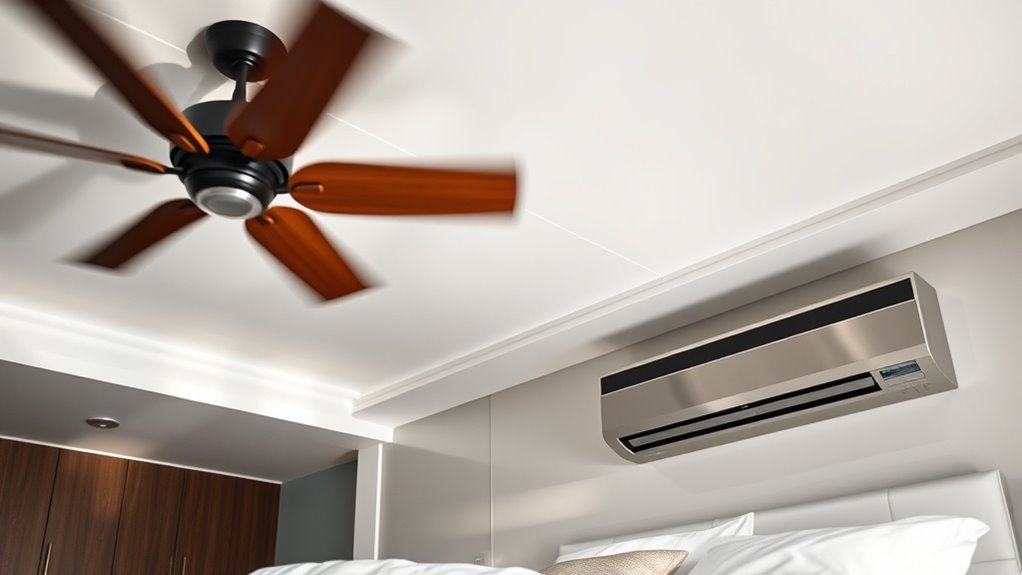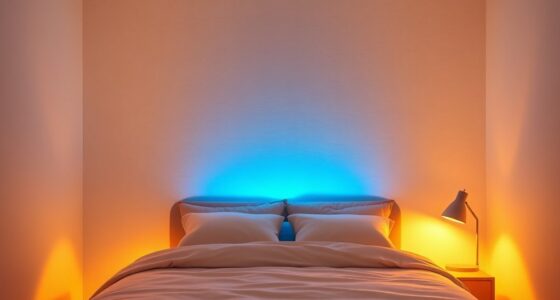If you want energy efficiency and quiet sleep, a ceiling fan might work best, as it circulates air without much noise. However, if you need consistent cooling and humidity control, an air conditioner is more effective, especially on hot nights. Combining both can offer balance—cooler comfort with less noise and lower energy costs. To find what suits your sleep and comfort needs, explore the details that follow.
Key Takeaways
- Air conditioning offers better temperature and humidity control, promoting more comfortable sleep in hot conditions.
- Ceiling fans are quieter and more energy-efficient but do not lower room temperature directly.
- Combining fans with AC can improve air circulation without increasing noise or energy costs significantly.
- Fans may cause sleep disruption due to noise, while modern AC units are typically whisper-quiet.
- Choose based on your priority: energy efficiency and airflow (fans) or cooling and humidity control (AC).

When it comes to cooling your home, ceiling fans and air conditioning are the two most popular options, each offering distinct benefits and drawbacks. If you’re aiming for a comfortable sleep environment, understanding how these cooling methods compare is essential. Ceiling fans are known for their energy efficiency, consuming considerably less electricity than air conditioners. This means you can run them longer without worrying about high energy bills, which is especially appealing if you’re trying to keep costs down while sleeping. They circulate air effectively, creating a breeze that helps you feel cooler without actually lowering the room temperature. However, when it comes to noise levels, ceiling fans can sometimes be disruptive. Depending on the model and placement, they can produce a hum or whirring sound that might interfere with your sleep, especially if you’re sensitive to noise. On the other hand, modern air conditioning units are quite quiet, with many operating at whisper-quiet levels, making them a popular choice for those who need absolute silence during rest. This quiet operation can be a game-changer if you struggle to fall asleep in noisy environments or prefer a completely silent room.
Energy efficiency is a key factor to weigh for sleep comfort. Ceiling fans use far less power than air conditioners, which means they’re more environmentally friendly and cost-effective over time. If you’re trying to maintain a consistent sleep temperature without skyrocketing your electricity bill, a ceiling fan can be an excellent choice, especially when combined with a slightly open window for fresh air. However, ceiling fans only help with air circulation and do not change the room temperature, so if the air is uncomfortably warm, they might not be enough on their own. Air conditioning, while more energy-intensive, actively lowers the room’s temperature, creating a more consistently cool environment. If you prefer a cooler room for sleeping, an air conditioner can provide immediate relief by reducing humidity and temperature, which can help you fall asleep faster and stay asleep longer. Additionally, some modern units come with smart thermostat features that optimize energy use and maintain ideal sleeping conditions more efficiently.
Ultimately, your choice depends on your priorities. If you value energy efficiency and quieter operation, a ceiling fan might be better, especially if your room is already moderately cool. But if you need a considerable drop in temperature for comfortable sleep, investing in an air conditioning unit might be worth the extra energy use and noise considerations. Combining both can also be effective—using a ceiling fan to circulate air and an air conditioner to cool the room when necessary. This approach balances energy efficiency, noise levels, and comfort, helping you sleep more soundly through warm nights.

Adamson B10 Gray Bed Cooling System - Twin 75” L x 39” W - Water Bed Cooler Ideal for Hot Sleepers - 100% Cotton Mattress Cooling Bed Pad for Night Sweats - 5-Year Assurance
KEEP YOUR BODY COOL: Thanks to an ingenious system using the principle of evaporative cooling, this bed cooler...
As an affiliate, we earn on qualifying purchases.
Frequently Asked Questions
Which Option Is More Energy-Efficient for Long-Term Use?
When considering energy savings and cost efficiency, ceiling fans generally use less electricity than air conditioning units. Fans circulate air without cooling it, which can lower your energy bill over time. Air conditioning offers more cooling power but consumes more energy, leading to higher costs. If long-term energy efficiency is your goal, using a ceiling fan combined with smart temperature management can be a more cost-effective choice.
Can Ceiling Fans Improve Air Quality in Bedrooms?
Imagine your bedroom as a calm oasis—ceiling fans can subtly enhance air quality through better air circulation. They gently promote dust reduction, helping you breathe easier. While they don’t purify the air, their movement prevents stagnant air and reduces allergens that might bother your sleep. So, yes, a ceiling fan can contribute to a fresher, more comfortable sleeping environment by encouraging healthier airflow.
Are There Health Risks Associated With Air Conditioning?
You might wonder if air conditioning poses health concerns. While it improves air quality by filtering dust and allergens, extended use can cause dry skin, throat irritation, or respiratory issues, especially if filters aren’t maintained properly. People with allergies or asthma should guarantee regular cleaning of AC units. Overall, using AC responsibly minimizes health risks, but staying aware of air quality and personal comfort is key to safe, healthy cooling.
How Noisy Are Ceiling Fans Compared to Air Conditioners?
When comparing noise levels, ceiling fans are generally quieter than air conditioners. You’ll notice that the sound comparison favors fans, as they produce a gentle hum or breeze without loud, constant noise. Ceiling fans typically operate at lower decibel levels, making them a more peaceful option for sleep. Air conditioners tend to be noisier, especially older models, which can disrupt your rest. So, if quietness matters, fans are usually the better choice.
Do Ceiling Fans Work Effectively in Very Humid Environments?
In very humid environments, ceiling fans can still be effective, but their performance depends on how well they circulate air. They help create a breeze that can make you feel cooler by increasing evaporation from your skin, even in humid air. However, in extremely humid conditions, fans alone might not reduce indoor moisture levels, so you might need additional dehumidification for ideal comfort and better fan effectiveness.

AquaPad Breeze Water Cooling Mattress Pad, 5 YR AquaCoverage, Remote Control, EvapoChill & SuperBlue Technology, Smooth, Hydro Cooled Mattress Topper, Bed Chiller (Double (for Queen/King/Calking))
[ USA + COVERAGE ] With our 5-year AquaCoverage and top-tier U.S.-based customer service, we provide unparalleled experiences....
As an affiliate, we earn on qualifying purchases.
Conclusion
Ultimately, choosing between a ceiling fan and air conditioning depends on your comfort preferences. Think of a ceiling fan as a gentle breeze on a warm day—refreshing and natural—while air conditioning is like stepping into a cool, crisp mountain stream. Both can help you sleep better, but pick what suits your vibe best. Whichever you choose, guarantee your sleep environment feels as soothing as a peaceful night under a starry sky.

Adamson B10 Bed Cooling System - Twin 75” L x 39” W - New - 100% Cotton Mattress Cooling Bed Pad for Night Sweats - Water Bed Cooler Ideal for Hot Sleepers - Improved Mattress Cooling System
KEEP YOUR BODY COOL: Thanks to an ingenious system using the principle of evaporative cooling, this bed cooler...
As an affiliate, we earn on qualifying purchases.

Adamson B10 Midnight Bed Cooling System - Twin 75” L x 39” W - New - 100% Cotton Mattress Cooling Bed Pad for Night Sweats - Ideal for Hot Sleepers - 5-Year Assurance
KEEP YOUR BODY COOL: Thanks to an ingenious system using the principle of evaporative cooling, this bed cooler...
As an affiliate, we earn on qualifying purchases.









